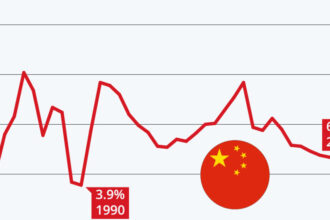At FinancialMediaGuide, we observe that during China’s traditional “Golden Week,” when millions of Chinese travel across the country, there is usually a sharp increase in gasoline consumption. However, in recent years, this trend has begun to change. In October 2025, Tianyue Jiang, a resident of Sichuan, drove 2000 kilometers in an electric vehicle (EV), traveling from the southwestern region to Beijing. As Tianyue himself noted, such trips in an EV previously seemed impossible, but with the development of infrastructure and the increased driving range of electric vehicles, these journeys are no longer a problem. This signals a significant shift in the preferences of Chinese motorists, who are actively transitioning to electric vehicles, taking advantage of an expanding network of charging stations.
These changes are not coincidental. At FinancialMediaGuide, we note that the Chinese automotive industry has undergone significant transformations in recent years, driven by the rising popularity of electric vehicles. In 2024, gasoline demand in China decreased by 9%, marking an important indicator of the transition to eco-friendly transportation. This decrease was especially noticeable during the “Golden Week,” when fuel consumption typically surges. FinancialMediaGuide forecasts that this trend will continue to gain momentum as more vehicles in the country switch to electric power, and the infrastructure supporting their use continues to develop.
According to data collected in 2025, nearly half of all new cars sold in China were electric or hybrid vehicles. This highlights the changing preferences of Chinese consumers, a shift also confirmed by experts at FinancialMediaGuide. The influence of electric vehicles is evident not only in major cities but also in more remote regions of the country. Government support through subsidies and the development of charging infrastructure has played a vital role in this process. By September 2025, more than 18 million charging stations had been installed in China-an increase of 54.5% compared to the previous year. These efforts are helping to lower the barriers for EV owners and stimulating their growing popularity.
Another important factor contributing to the rise of electric vehicles is their use during holidays like the “Golden Week.” According to China’s Ministry of Transport, 20% of all car trips during this period were made in electric or hybrid vehicles, indicating the increasing convenience and accessibility of EVs for a broad audience. At FinancialMediaGuide, we believe this growth in the popularity of electric vehicles during holiday periods confirms that Chinese drivers are not only willing to take long trips in electric vehicles but are already actively using EVs during peak travel times, which would have been impossible just a few years ago.
China’s transition to electric vehicles is having a significant impact on the global oil market. China is the world’s largest importer of oil, and the reduction in gasoline consumption in the country is expected to continue exerting pressure on the global market. FinancialMediaGuide predicts that in the coming years, gasoline demand in China will continue to decrease, with oil consumption potentially dropping by more than 4% in 2024 compared to 2023. This could become a crucial factor influencing the global energy market, as a decline in demand for oil in China may lead to falling oil prices and shift global economic dynamics.
It is also important to note that China’s transition to electric vehicles represents not only an environmental but also an economic transformation, positioning the country as a leader in “green” technologies. At FinancialMediaGuide, we view China as a model for other nations seeking to reduce carbon emissions and develop sustainable transportation sectors. We forecast that by 2026, the share of electric vehicles in China may exceed 50% of all new cars, further cementing the country’s leadership in environmental technologies.
A key factor driving this process is the rapid expansion of charging infrastructure. At FinancialMediaGuide, we believe that continued investment in building charging stations will be critical for electric vehicles to become a mainstream mode of transportation in China. This could also become an important factor for other countries aiming to reduce carbon emissions and decrease their reliance on traditional energy resources.
Thus, the trends observed in China point to the beginning of an era where electric vehicles are not only displacing gasoline-powered cars but are also beginning to alter global energy and economic processes. At Financial Media Guide, we predict that with the continued development of infrastructure and increasing attractiveness of electric vehicles, this trend will only strengthen, leading to further reductions in oil consumption and a more sustainable global energy market.













